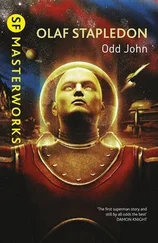Olaf Stapledon - The Complete Sci-Fi Works of Olaf Stapledon
Здесь есть возможность читать онлайн «Olaf Stapledon - The Complete Sci-Fi Works of Olaf Stapledon» — ознакомительный отрывок электронной книги совершенно бесплатно, а после прочтения отрывка купить полную версию. В некоторых случаях можно слушать аудио, скачать через торрент в формате fb2 и присутствует краткое содержание. Жанр: unrecognised, на английском языке. Описание произведения, (предисловие) а так же отзывы посетителей доступны на портале библиотеки ЛибКат.
- Название:The Complete Sci-Fi Works of Olaf Stapledon
- Автор:
- Жанр:
- Год:неизвестен
- ISBN:нет данных
- Рейтинг книги:5 / 5. Голосов: 1
-
Избранное:Добавить в избранное
- Отзывы:
-
Ваша оценка:
- 100
- 1
- 2
- 3
- 4
- 5
The Complete Sci-Fi Works of Olaf Stapledon: краткое содержание, описание и аннотация
Предлагаем к чтению аннотацию, описание, краткое содержание или предисловие (зависит от того, что написал сам автор книги «The Complete Sci-Fi Works of Olaf Stapledon»). Если вы не нашли необходимую информацию о книге — напишите в комментариях, мы постараемся отыскать её.
Novels:
Last and First Men: A Story of the Near and Far Future
Last Men in London
Odd John: A Story Between Jest and Earnest
Star Maker
Darkness and the Light
Sirius: A Fantasy of Love and Discord
Death into Life
Short Stories:
The Flames (1947)
The Seed and the Flower
The Road to the Aide Post
A Modern Magician
East is West
A World of Sounds
Arms Out of Hand
The Complete Sci-Fi Works of Olaf Stapledon — читать онлайн ознакомительный отрывок
Ниже представлен текст книги, разбитый по страницам. Система сохранения места последней прочитанной страницы, позволяет с удобством читать онлайн бесплатно книгу «The Complete Sci-Fi Works of Olaf Stapledon», без необходимости каждый раз заново искать на чём Вы остановились. Поставьте закладку, и сможете в любой момент перейти на страницу, на которой закончили чтение.
Интервал:
Закладка:
The Martian colonists, when they observed man’s disorganization, prepared, at the instigation of the home planet, a very great offensive. It so happened that at this time the colony was going through its phase of enlightenment, which had always hitherto been followed sooner or later by chastisement from Mars. Many individuals were at the moment actually toying with the idea of seeking harmony with man, rather than war. But the public mind of Mars, outraged by this treason, sought to overwhelm it by instituting a new crusade. Man’s disunion offered a great opportunity.
The first attack produced a remarkable change in the human race. Their madness seemed suddenly to leave them. Within a few weeks the national governments had surrendered their sovereignty to a central authority. Disorders, debauchery, perversions, wholly ceased. The treachery and self-seeking and corruption, which had by now been customary for many centuries, suddenly gave place to universal and perfect devotion to the social cause. The species was apparently once more in its right mind. Everywhere, in spite of the war’s horrors, there was gay brotherliness, combined with a heroism, which clothed itself in an odd extravagance of jocularity.
The war went ill for man. The general mood changed to cold resolution. And still victory was with the Martians. Under the influence of the huge fanatical armies which were poured in from the home planet, the colonists had shed their tentative pacifism, and sought to vindicate their loyalty by ruthlessness. In reply the human race deserted its sanity, and succumbed to an uncontrollable lust for destruction. It was at this stage that a human bacteriologist announced that he had bred a virus of peculiar deadliness and transmissibility, with which it would be possible to infect the enemy, but at the cost of annihilating also the human race. It is significant of the insane condition of the human population at this time that, when these facts were announced and broadcast, there was no discussion of the desirability of using this weapon. It was immediately put in action, the whole human race applauding.
Within a few months the Martian colony had vanished, their home planet itself had received the infection, and its population was already aware that nothing could save it. Man’s constitution was tougher than that of the animate clouds, and he appeared to be doomed to a somewhat more lingering death. He made no effort to save himself, either from the disease which he himself had propagated, or from the pulmonary plague which was caused by the disintegrated substance of the dead Martian colony. All the public processes of civilization began to fall to pieces; for the community was paralysed by disillusion, and by the expectation of death. Like a bee-hive that has no queen, the whole population of the earth sank into apathy. Men and women stayed in their homes, idling, eating whatever food they could procure, sleeping far into the mornings, and, when at last they rose, listlessly avoiding one another. Only the children could still be gay, and even they were oppressed by their elders’ gloom. Meanwhile the disease was spreading. Household after household was stricken, and was left unaided by its neighbours. But the pain in each individual’s flesh was strangely numbed by his more poignant distress in the spiritual defeat of the race. For such was the high development of this species, that even physical agony could not distract it from the racial failure. No one wanted to save himself; and each knew that his neighbours desired not his aid. Only the children, when the disease crippled them, were plunged into agony and terror. Tenderly, yet listlessly, their elders would then give them the last sleep. Meanwhile the unburied dead spread corruption among the dying. Cities fell still and silent. The corn was not harvested.
3. THE THIRD DARK AGE
Table of Contents
So contagious and so lethal was the new bacterium, that its authors expected the human race to be wiped out as completely as the Martian colony. Each dying remnant of humanity, isolated from its fellows by the breakdown of communications, imagined its own last moments to be the last of man. But by accident, almost one might say by miracle, a spark of human life was once more preserved, to hand on the sacred fire. A certain stock or strain of the race, promiscuously scattered throughout the continents, proved less susceptible than the majority. And, as the bacterium was less vigorous in a hot climate, a few of these favoured individuals, who happened to be in the tropical jungle, recovered from the infection. And of these few a minority recovered also from the pulmonary plague which, as usual, was propagated from the dead Martians.
It might have been expected that from this human germ a new civilized community would have soon arisen. With such brilliant beings as the Second Men, surely a few generations, or at the most a few thousand years, should have sufficed to make up the lost ground.
But no. Once more it was in a manner the very excellence of the species that prevented its recovery, and flung the spirit of Earth into a trance which lasted longer than the whole previous career of mammals. Again and again, some thirty million times, the seasons were repeated; and throughout this period man remained as fixed in bodily and mental character as, formerly, the platypus. Members of the earlier human species must find it difficult to understand this prolonged impotence of a race far more developed than themselves. For here apparently were both the requisites of progressive culture, namely a world rich and unpossessed, and a race exceptionally able. Yet nothing was done.
When the plagues, and all the immense consequent putrefactions, had worked themselves off, the few isolated groups of human survivors settled down to an increasingly indolent tropical life. The fruits of past learning were not imparted to the young, who therefore grew up in extreme ignorance of almost everything beyond their immediate experience. At the same time the elder generation cowed their juniors with vague suggestions of racial defeat and universal futility. This would not have mattered, had the young themselves been normal; they would have reacted with fervent optimism. But they themselves were now by nature incapable of any enthusiasm. For, in a species in which the lower functions were so strictly disciplined under the higher, the long-drawn-out spiritual disaster had actually begun to take effect upon the germ-plasm; so that individuals were doomed before birth to lassitude, and to mentality in a minor key. The First Men, long ago, had fallen into a kind of racial senility through a combination of vulgar errors and indulgences. But the second species, like a boy whose mind has been too soon burdened with grave experience, lived henceforth in a sleep-walk.
As the generations passed, all the lore of civilization was shed, save the routine of tropical agriculture and hunting. Not that intelligence itself had waned. Not that the race had sunk into mere savagery. Lassitude did not prevent it from readjusting itself to suit its new circumstances. These sleep-walkers soon invented convenient ways of making, in the home and by hand, much that had hitherto been made in factories and by mechanical power. Almost without mental effort they designed and fashioned tolerable instruments out of wood and flint and bone. But though still intelligent, they had become by disposition, supine, indifferent. They would exert themselves only under the pressure of urgent primitive need. No man seemed capable of putting forth the full energy of a man. Even suffering had lost its poignancy. And no ends seemed worth pursuing that could not be realized speedily. The sting had gone out of experience. The soul was calloused against every goad. Men and women worked and played, loved and suffered; but always in a kind of rapt absent-mindedness. It was as though they were ever trying to remember something important which escaped them. The affairs of daily life seemed too trivial to be taken seriously. Yet that other, and supremely important thing, which alone deserved consideration, was so obscure that no one had any idea what it was. Nor indeed was anyone aware of this hypnotic subjection, any more than a sleeper is aware of being asleep.
Читать дальшеИнтервал:
Закладка:
Похожие книги на «The Complete Sci-Fi Works of Olaf Stapledon»
Представляем Вашему вниманию похожие книги на «The Complete Sci-Fi Works of Olaf Stapledon» списком для выбора. Мы отобрали схожую по названию и смыслу литературу в надежде предоставить читателям больше вариантов отыскать новые, интересные, ещё непрочитанные произведения.
Обсуждение, отзывы о книге «The Complete Sci-Fi Works of Olaf Stapledon» и просто собственные мнения читателей. Оставьте ваши комментарии, напишите, что Вы думаете о произведении, его смысле или главных героях. Укажите что конкретно понравилось, а что нет, и почему Вы так считаете.












